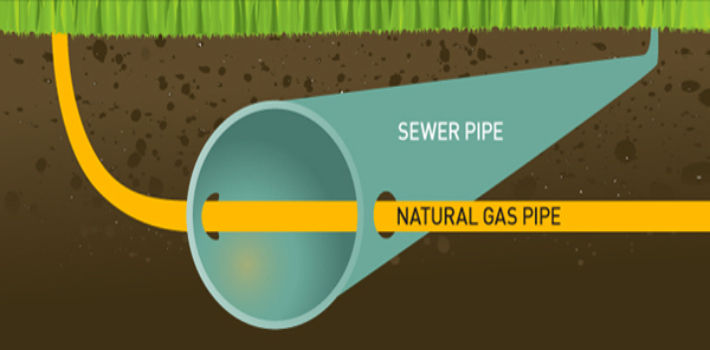Cross Bore Awareness
What Is a Cross Bore and Why Is It Dangerous?
A cross bore is an underground utility line that was inadvertently bored through a sewer, septic line or other underground utility. If a sewer backup develops in your home or business, it is common practice for homeowners and plumbers to use mechanical rotary devices to clear blocked sewer or septic lines. This can be dangerous because the process will almost always damage the utility line that was bored through the sewer line. If an electric line is cut, there is risk of electrocution. If a gas line is damaged, gas can migrate through the sewer line and into homes and buildings. This could result in a major accident, involving injuries, deaths and significant property damage.
To learn what to do if you encounter a potential cross bore situation, select one of the following videos: homeowner, plumber, field crew.
We recommend contracting a licensed plumber who has camera equipment capable of identifying a cross bore. Regardless of who performs the work - homeowner, plumber, or anyone else - before using a mechanical rotary device to clean out a sewer line that is blocked between the house and sewer main:
- Use a camera to identify the location of the blockage
- Contact MISS DIG 811 by calling 811 or visiting missdig811.org and request emergency staking due to a sewer blockage
- Then, call DTE Energy at 800.477.4747 and request assistance with possible sewer cross bore
At any time, if you suspect or smell a gas leak:
- Do NOT use any electrical devices (including cell phones), open flames or power equipment
- Immediately leave the area and instruct others to do the same
- From a distance where you no longer smell gas, dial 911 and then call the DTE Energy Gas Leak Line at 800.947.5000
DTE always contacts MISS DIG 811 to have underground utilities marked before we dig. We are also Gold Shovel Standard certified, which means we demonstrate high safety standards and ongoing training and education for employees in industry best practices regarding safe digging.
DTE is also piloting added safety procedures in 2018 to reduce the potential risk of creating cross bores. The pilot includes performing pre- or post-construction confirmation of sewer lines via camera inspections or other methods.
Your safety is our top priority, That's why - despite never experiencing any cross-bore related incidents - DTE is communicating this important information to help prevent accidents before they occur.
For decades, DTE Energy and other energy companies around the country have utilized trenchless technology instead of digging trenches to install various utilities, including electric conduit, natural gas pipe and telecommunications cable. This way, we minimize disruption to customers' property.
As mentioned, DTE always contacts MISS DIG 811 before any digging activity. However, sewer lines can escape detection because their material composition does not always register on above ground location detection equipment. Also, since sewer lines are frequently privately owned, they are not always located through the MISS DIG 811 system and mapped by municipalities. Thus, sometimes underground utilities are unknowingly installed through unmarked sewer and septic lines.
No. Trenchless equipment is designed to bore through hard substances, including clay. Boring through a sewer line feels no different to the equipment operator. A cross bore may go undetected for months, even years. By following cross bore safety procedures, you can help us keep your family and your neighbors safe.
